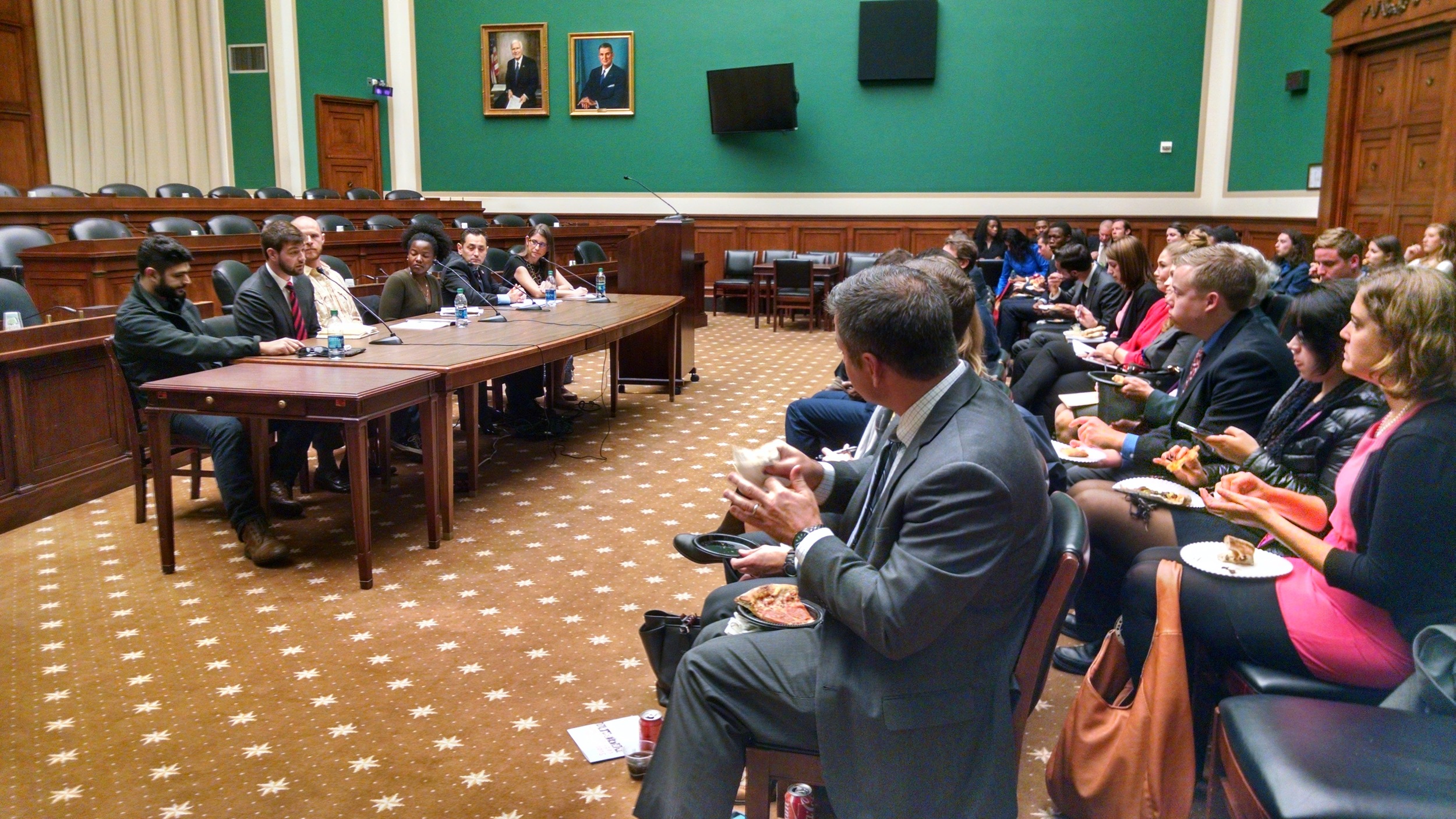In January, Engine launched the Diversifying Tech Caucus, a bicameral, bipartisan Caucus that’s now grown to over 30 members committed to increasing the number of women, minorities, veterans, and other underrepresented groups in the tech sector. Since then, Engine has hosted briefings on the Hill that further this conversation. This week, in light of Veterans Day, we hosted a briefing to highlight the work of veterans in the industry and how Congress can better support them. Moderated by Engine’s Executive Director, Julie Samuels, the panel included Todd Bowers (Director UberMILITARY, Uber), Nicole Isaac (Head of Economic Graph Policy Partnerships, LinkedIn), Steve Weiner (Co-Founder, VetTechTrek), Andrew Kemendo (Founder & CEO, Pair Inc.), and Rob Polston (Recruiter, Amazon Web Services).
The conversation among this group of veterans and tech industry leaders demonstrated the huge potential of the veteran community to succeed in this sector . As Andrew Kemendo put it: “We need strong executors starting companies—and I see no better people for this than veterans.” It also highlighted the ways our policies for veterans fall short. Here’s what we and the audience of over 60 Hill staffers and friends from the veteran community heard:
- We must give veterans a running start BEFORE exiting the military to make them competitive candidates for tech industry jobs. The one week Transition Assistance Program is not enough for transitioning service members; currently, the Department of Labor’s employment workshop is a one-size-fits-all program that still leaves a lot of guesswork for newly transitioned veterans trying to get into the tech industry. Beyond simply accessing more information about appropriate job opportunities in the tech industry, service members should be encouraged to take up additional training or internships before they leave the military and be provided with the support to evaluate career options (and the skills they require) before they transition. For example, Amazon Web Services is partnering with Microsoft to hire some of the graduates of their Microsoft Software & Systems Academy—a 16 week development initiative focused on developing tech-ready, active-duty service members.
- Veteran entrepreneurs need a better network and access to capital. When members transition out of the military, they have little money in the bank and have a far smaller network of potential funders and co-founders than potential entrepreneurs who graduated from Stanford or worked at Google. This puts veteran entrepreneurs at a disadvantage. In order to make the connections they need to build funding opportunities, they need access to mentors and people with experience. The VET Act, introduced by Senators Moran and Tester, allows veterans to use GI benefits towards starting a business, but these entrepreneurs also need experienced funders and advisors that have started businesses and can provide connections to bigger networks, improving access to capital.
- GI benefits aren’t currently supporting the veteran tech talent pipeline. For example, “skills academies” (such as coding bootcamps and hackschools) are not clearly covered by the GI Bill, though these programs are well recognized by the tech sector and would improve the bridge between military resumes and tech company job descriptions. In addition to being a resource for brushing up on valuable technical or business skills in pursuit of landing a job in the tech industry, skills academies also provide a hiring partner network that enables an easier transition from student to employee. VetTechTrek organizes high-impact trips for veterans to leading tech companies and expose veterans to opportunities for training that can jumpstart their career in the tech industry— and skills academies, as they put it, provide “an environment very similar to a military qualification process: a focus on prerequisites and only the essential skills to complete the task.”
Veterans have notoriously been an underrepresented community in the tech sector. But this panel (as well as the veterans featured in our latest booklet “Supporting Vets Who Tech”) demonstrated that there is room for the government to proactively make changes, working in conjunction with industry players, to improve veterans’ access to jobs in the tech industry. We look forward to working with members of Congress on policy efforts aimed at strengthening the veteran tech talent pipeline.



